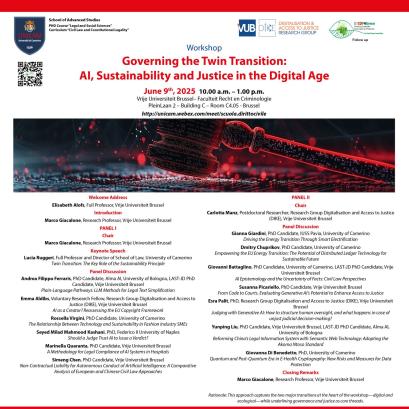
Today, June 9th, 2025, the Digitalisation & Access to Justice – DIKE Research Group is hosting the international workshop “Governing the Twin Transition: AI, Sustainability and Justice in the Digital Age” at the Vrije Universiteit Brussel, within the Department of Private and Economic Law (PREC).
The workshop brings together legal scholars and early-career researchers from across Europe to examine how justice systems are responding to the twin transition that defines the contemporary global agenda: the accelerating digital transformation driven by artificial intelligence and emerging technologies, and the pressing ecological transition requiring fundamental shifts in governance, regulation, and sustainability policy.
Throughout the morning, participants present and debate new research on a wide range of legal topics. The discussions address the complex interplay between technological innovation and legal certainty, the regulatory implications of blockchain and distributed ledger technologies, the potential of smart contracts and AI for reforming legal processes, and the role of courts and legal professionals in a context increasingly shaped by automation and data-driven decision-making. Special attention is given to issues such as access to justice in the digital age, energy law and smart electrification, and the integration of sustainability principles into both private and public legal frameworks.

The workshop is coordinated by Professors Marco Giacalone, Elisabeth Alofs, and Lucia Ruggeri, whose guidance ensures the academic quality and coherence of the event. The research presented today reflects the diversity of perspectives and expertise emerging from doctoral programs and interdisciplinary research groups across Europe. Speakers include Andrea Filippo Ferraris, Emma Aldibs, Rossella Virgini, Seyed Milad Mahmood Kashani, Marinella Quaranta, Simeng Chen, Carlotta Manz, Gianna Giardini, Dmitry Chuprikov, Giovanni Battaglino, Susanna Picariello, Esra Palit, Yumping Liu, and Giovanna Di Benedetto, whose contributions demonstrate the richness and complexity of the current debate on law, technology, and sustainability.
The workshop is supported by the University of Camerino and the ECOM4Justice Project, both of which play a key role in promoting research at the intersection of ecological transition, justice reform, and digital innovation. Their involvement underscores the importance of continued academic collaboration in addressing global challenges through law and policy.
As the event unfolds, it becomes increasingly clear that governing the twin transition requires not only legal adaptation but also new ways of thinking about responsibility, accountability, and justice in a rapidly changing world. By fostering dialogue on these themes, the DIKE Research Group reaffirms its commitment to supporting legal innovation in service of a more equitable and sustainable digital society.
